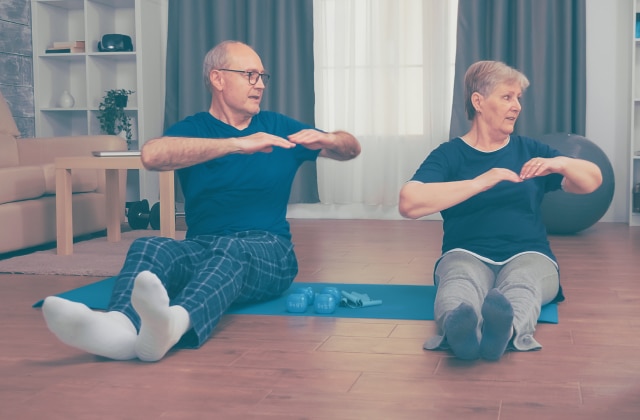Abdominal Exercises for Seniors
![]() Attention: This article describes exercises that may require consultation with a doctor.
Attention: This article describes exercises that may require consultation with a doctor.
As we age, maintaining a strong and healthy core becomes increasingly important for overall well-being and independence. Abdominal exercises for seniors offer a range of benefits, helping to enhance posture, balance, and functional strength.
Before undertaking any of the listed exercises, please consult physician.
Angel Care physiotherapists assist patients through every stage of recovery, from the initial diagnosis to the restorative and preventive phases.
Effective Core Strengthening Exercises for Seniors: Enhance Your Core Health!
Maintaining a strong core is vital for seniors to enjoy a healthier and more active life. Here’s a gentle routine of core-strengthening exercises tailored for older adults:
- Chair Crunches:
Sit comfortably in a chair with your back straight.
Place your hands behind your head and gently lift your right knee towards your chest while crunching your torso slightly.
Lower your leg and repeat on the other side.
Aim for 2 sets of 10-12 repetitions. - Seated Rotation:
Sit on a chair with your back straight and feet flat on the floor.
Place your hands on your hips and gently rotate your upper body to the right, then to the left.
Perform the exercise in a controlled manner for 2 sets of 12 repetitions. - Leg Marches:
Lie on your back with your arms by your sides.
Lift one leg off the ground, bending the knee slightly, and then lower it back down.
Alternate legs and continue the marching motion for 2 sets of 10-12 repetitions.

Strengthening Your Core for a Healthier Life
By incorporating abdominal exercises for seniors into your daily routine, you can experience several key benefits:
- Improved Posture: Strengthening your core muscles with abdomen exercises for seniors helps support your spine and promotes better posture. This can reduce the risk of developing posture-related issues and back pain.
- Enhanced Balance and Stability: Belly exercises for seniors and stomach exercises focus on the muscles responsible for balance. Strengthening these muscles can help prevent falls and improve overall stability.
- Increased Functional Strength: Engaging in tummy exercises for seniors and other core-strengthening exercises enhances your functional strength, making everyday activities easier and more manageable.
- Pain Management: Strengthened core muscles can alleviate lower back pain, a common issue among seniors. Regular core exercises can help reduce discomfort and improve overall mobility.
- Boosted Confidence and Independence: As you become more adept at these abdominal exercises, your confidence in your physical abilities will grow, leading to greater independence in daily activities.
Before performing any of the exercises mentioned above, be sure to consult with your doctor.
If you or your loved one requires home care, team Angel Care Agency is ready to help and provide recommendations, offer qualified nurses and support for you. Contact us at 917-507-7500 or via email at [email protected] to take charge of your well-being and lead a fulfilling life with improved core health.

Dementia is a global health challenge that affects millions of individuals and their families. Providing quality care for people with dementia requires a multifaceted approach that encompasses medical, social, and financial aspects. In the United States, Medicaid plays a vital role in supporting dementia care for low-income individuals and families. In this article, we will explore the significance of Medicaid in dementia care, the services it offers, and the importance of ensuring dignity and compassion in the provision of care. Medicaid and Dementia Care Medicaid is a joint federal and state program that provides health coverage for low-income individuals and families. While Medicaid offers a wide range of services, including hospital visits, doctor appointments, and prescription medications, it also plays a critical role in supporting long-term care services, such as those needed by individuals living with dementia. Dementia care often involves a spectrum of services, including medical care, memory support, counseling, caregiver training, and assistance with activities of daily living. Medicaid's coverage for dementia care varies by state, but it typically includes nursing home care, home-based care, and community-based services. These services are crucial in ensuring that individuals with dementia receive the necessary support to maintain their well-being and quality of life. Home-Based Care Medicaid's support for home-based care is particularly significant for individuals with dementia. Many individuals prefer to remain in familiar surroundings, surrounded by loved ones, as they navigate the challenges posed by dementia. Home-based care services covered by Medicaid can include home health aides, skilled nursing services, therapy sessions, and respite care for caregivers. These services allow individuals with dementia to receive the necessary medical attention and assistance with daily activities while remaining in the comfort and familiarity of their own homes. Furthermore, Medicaid's coverage of respite care provides caregivers with much-needed relief, reducing stress and promoting their own well-being. Nursing Home Care For individuals with advanced dementia or those who require round-the-clock care, nursing homes can provide a safe and supportive environment. Medicaid is the primary payer for nursing home care in the United States, ensuring that low-income individuals with dementia have access to these facilities. Medicaid's coverage for nursing home care includes room and board, medical care, rehabilitation services, personal care assistance, and specialized dementia care. It is essential to ensure that nursing homes offer person-centered care that respects the dignity and autonomy of individuals with dementia. NHTD Individuals with dementia can also have support from the NHTD program. Nursing Home Transition and Diversion is a Medicaid Waiver program, the aim of this program is to assist people with disabilities and seniors to live in their homes or community instead of a nursing home. The program can provide funding for assistive technology, which can include devices to help manage safety concerns related to dementia, such as alarms and monitors. The program can also provide funding for modifications to the home to make it safer and more accessible for someone with dementia. This could include things like adding grab bars, improving lighting, or even creating a secure outdoor area. Dementia care near me NY Medicaid plays a crucial role in supporting dementia care for low-income individuals and families. Its coverage of home-based care and nursing home services enables individuals with dementia to receive the necessary support while maintaining their dignity and quality of life. By promoting person-centered care and prioritizing compassion and dignity, Medicaid can contribute to a more inclusive and supportive healthcare system for those living with dementia. It is essential that policymaker. If you need support with your healthcare, please contact our qualified home care agency, Angel Care Inc., located in New York. We will provide all necessary recommendations and offer qualified assistance. Rich us by phone 917-507-7500 or e-mail: [email protected]

As we age, maintaining a strong and healthy back becomes increasingly important. Back pain and discomfort are common issues that many seniors face, impacting their mobility and overall well-being. Fortunately, incorporating back strengthening exercises into a daily routine can bring about significant benefits and help seniors maintain a better quality of life. A strong back is essential for supporting the spine, improving posture, and reducing the risk of injury. Back strengthening exercises target key muscles in the lower back, core, and posterior chain, promoting better stability, flexibility, and overall strength. Before starting any of the listed exercises, make sure to check with your physician. Or contact our Physical Therapy unit for a consultation. Exercises for Back Pain for Seniors Back pain is a prevalent issue among seniors, often caused by factors such as muscle weakness, poor posture, and age-related degeneration of the spine. Regular exercise can play a crucial role in managing and alleviating back pain. Here are some effective exercises tailored specifically for seniors experiencing back pain: Cat-Cow Stretch: This exercise targets the flexibility of the spine and helps relieve tension in the back muscles. Start on your hands and knees, then arch your back upward (like a cat) while inhaling. Then, round your back downward (like a cow) as you exhale. Repeat this gentle stretching motion for 8-10 repetitions. Exercises for Seniors with Lower Back Pain Lower back pain can be especially bothersome for seniors, limiting their mobility and overall quality of life. However, there are safe and effective exercises that can help seniors manage and reduce lower back pain. Here is an exercise tailored for seniors dealing with lower back discomfort: Pelvic Clocks: Lie on your back with knees bent and feet flat on the floor. Imagine a clock on your pelvis, and gently tilt your pelvis in different directions, following the numbers on the clock. This exercise promotes mobility and stability in the lower back region. Exercise to Strengthen Lower Back for Seniors Strengthening the lower back muscles is crucial for seniors, as it can improve stability, reduce pain, and prevent injuries. Here is an exercise to strengthen the lower back specifically designed for seniors: Bird-Dog Exercise: Start on your hands and knees. Extend one arm forward and the opposite leg backward, creating a straight line with your body. Hold for a few seconds, then switch to the other arm and leg. This exercise strengthens the entire posterior chain, including the lower back. Scoliosis Exercises for Seniors Scoliosis, an abnormal sideways curvature of the spine, can be a challenging condition for seniors to manage. While exercise alone cannot cure scoliosis, specific exercises can help improve posture, increase flexibility, and reduce discomfort. Here is an exercise that may benefit seniors with scoliosis: Side Stretch: Stand with feet shoulder-width apart. Raise one arm overhead and lean gently to the opposite side, elongating the spine. Repeat on the other side. This exercise helps stretch the spine and improve lateral flexibility. It's essential for seniors with scoliosis to consult with a healthcare professional or physical therapist to determine the most appropriate exercises and ensure they are performed correctly and safely. Benefits of Back Strengthening Exercises for Seniors Engaging in back strengthening exercises can bring numerous benefits to seniors, improving their quality of life. Some advantages include increased muscle strength, improved posture, enhanced flexibility, better balance, reduced back pain, and increased bone density. Specialists at Angel Care Agency offer a wide range of skilled services dedicated to caring for elderly individuals. Whether it's assisting with daily tasks, providing physical therapy exercises, or offering companionship, our team is dedicated to supporting seniors in their journey to improved back health. If you require consultation or assistance, please don't hesitate to reach out to us at 917-507-7500 or via email at [email protected] We are here to help seniors lead more fulfilling lives with less back pain and enhanced overall well-being.



